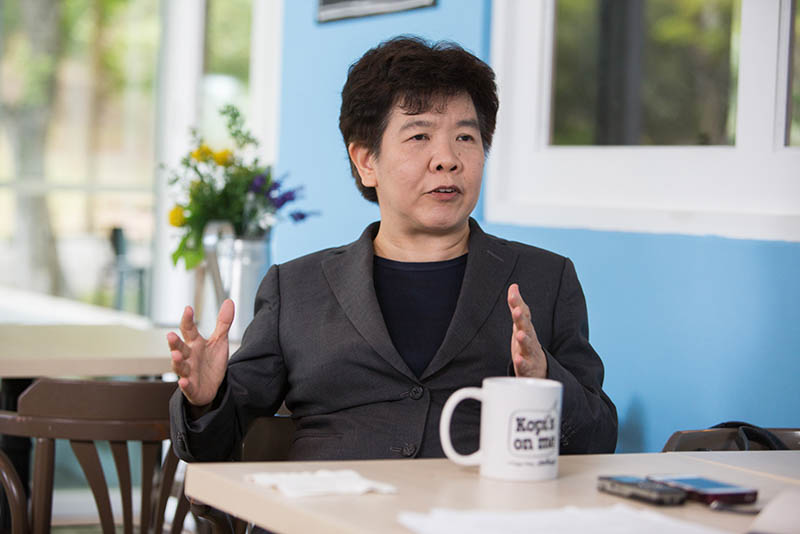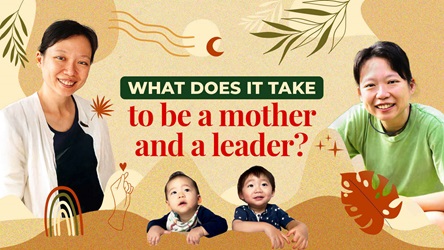"I've Never Felt The Need To Get A Master's"

Once, in an address to Ministry of Education (MOE) scholars about to begin their university education, Ms Chan Lai Fung said something that probably surprised them.
“I told them, ‘Please don’t spend the next four years just burying your heads in your books, thinking that what you need to do is to get your first-class honours and impress us,’” the Permanent Secretary for Education tells Challenge in an interview at Artisan Dessert Bar, near the MOE headquarters.
“I don’t really care what class of degree you have as long as you show me that you can be a good teacher.”
This includes the ability to engage students, which is essential to good teaching too, she notes. In her view, although gaining paper qualifications is a way to develop mastery in a field, it does not guarantee a successful career. Rather, it is more important to keep up with developments in real life and learn along the way.
“I’ve never felt the need to get a Master’s,” says Ms Chan, who holds a Bachelor of Economics from Monash University. “If you’re able to show what you can bring to the table at the workplace, nobody cares if you have a Master’s or not.”
She recalls being inspired by former Head of Civil Service Lim Siong Guan, who once told a group of young officers that he did not have a Master’s but that had not stopped him from learning along the way and excelling in the Public Service.
Like him, she tries to adopt the same mindset towards learning.
This attitude has served her well in her nearly 30 years in the Public Service. Prior to her current appointment, she had helmed the law and finance ministries.
Ms Chan’s perspective echoes a key message behind the recently launched SkillsFuture initiatives – rather than focusing narrowly on grades, a person is better off picking up relevant skills and adopting an attitude of lifelong learning beyond the classroom.
Her problem with tuition
Despite the ministry’s efforts to broaden our understanding of success, getting Singaporeans to look beyond paper qualifications remains a challenge, admits Ms Chan.

Many parents still overvalue grades, sending their children to tuition classes even when the latter are already doing well in school. This includes parents who sign their children up for tuition so that they can qualify for the Gifted Education Programme.
“I am not sure if these children are indeed gifted, if they require all these artificial boosts and support,” says Ms Chan.
She also fears that the heavy reliance on tuition would rob our children of their ability to learn independently and hurt their prospects at work as adults.
“If your boss gives you a problem… there’s no tuition teacher to turn to. You must figure it out yourself.”
A teacher to other officers
Ms Chan is regularly invited to speak at the Civil Service College. She enjoys sharing her experiences with younger officers and feels gratified when they tell her that her comments resonated with them.“I don’t know if it’s my unfulfilled desire to be a teacher… I think there’s a part of me that likes to influence lives,” she says with a laugh. Whenever Ms Chan’s staff come to her because they feel they are not progressing in their career, she shares with them her experience: There was a time in her career when, unlike her peers, she was not offered the opportunity for further studies; at the same time, her juniors were promoted to the same grade as her.

She did not let that affect her work. The following year, she was posted to another ministry where she had back-to-back promotions – rather uncommon, especially given her slower progression in her earlier years.
Ms Chan observes that some public officers, eager to prove their worth, engage in individualistic or self-serving behaviour that bosses can easily see through.
To these officers, she has the following advice: “Do your best, be yourself, be a team player, and have a good attitude.”
And soon, she believes, the opportunities to show their capabilities will come.
Strengthening engagement
One of Ms Chan’s biggest challenges is to communicate the MOE’s policies to its more than 30,000 teachers and officers. This is a mammoth task because messages tend to lose their essence as they are filtered at every level before they reach the ground.
So besides forming a communications and engagement unit to sharpen the messages, and relying on the principals to share the messages with the teachers, Ms Chan and her colleagues in senior management have made it a point to visit all 365 MOE schools, a process that will take at least two years to cover every school.
“Nothing can substitute for direct selling,” she explains.
As hot button issues in education are common conversation topics, Ms Chan also has to manage feedback on her ministry’s policies from friends and acquaintances.
At social gatherings – she likes catching up with friends over a Japanese meal, her favourite cuisine – she does not mind talking about the MOE’s work and would seize the opportunity to rectify any misimpressions.
“If I can correct even one or two impressions of an individual, that person can be an ambassador of that viewpoint and help others understand what the MOE is trying to do.”

What's in your cuppa?
Usually latte without sugar, or black coffee with milk and no sugar.
Where do you take it?
At home for breakfast and at work after lunch.
- POSTED ON
May 1, 2015
- TEXT BY
Chen Jingting
- PHOTOS BY
Norman Ng









